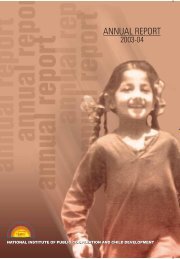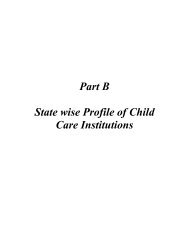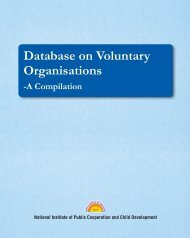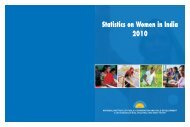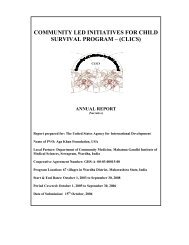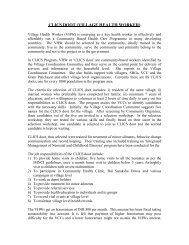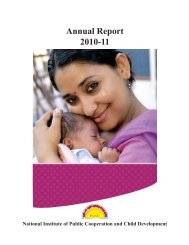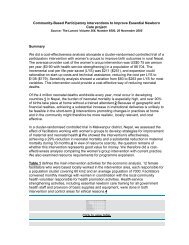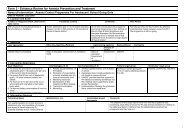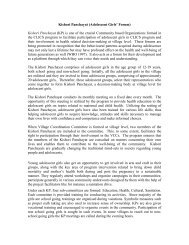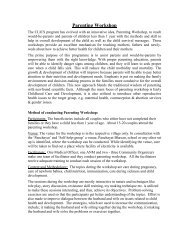Research Abstracts on Child Labour Women Labour - Nipccd
Research Abstracts on Child Labour Women Labour - Nipccd
Research Abstracts on Child Labour Women Labour - Nipccd
You also want an ePaper? Increase the reach of your titles
YUMPU automatically turns print PDFs into web optimized ePapers that Google loves.
15<br />
<str<strong>on</strong>g>Research</str<strong>on</strong>g> <str<strong>on</strong>g>Abstracts</str<strong>on</strong>g> <strong>on</strong> <strong>Child</strong> <strong>Labour</strong>, <strong>Labour</strong> and <strong>Women</strong> <strong>Labour</strong> 1998 - 2009<br />
Domestic Worker<br />
Lakshmi Rani, D. and Roy, Manabendra Nath. (2005).<br />
<strong>Child</strong> domestic work : a violati<strong>on</strong> of human rights : issues, causes and c<strong>on</strong>sequences in<br />
West Bengal. New Delhi : Save the <strong>Child</strong>ren. 40 p.<br />
Key Words : 1.CHILD LABOUR 2.DOMESTIC WORKER 3.WEST BENGAL.<br />
Abstract : The most vulnerable and exploited children of all, as well as the most difficult<br />
to protect, may well be those in domestic service. The present study was d<strong>on</strong>e to<br />
understand the factors resp<strong>on</strong>sible for leading children into domestic work and the<br />
situati<strong>on</strong> of children engaged in domestic work in Kolkata city. The sample was taken from 3<br />
endemic districts of West Bengal namely East Midnapur, 24 Parganas South and 24<br />
Parganas North, and data was collected through surveys. It was found that most child<br />
domestic worker (CDW) families were landless and depended <strong>on</strong> wages of daily labour for<br />
their livelihood, which was seas<strong>on</strong>al and irregular. So children were sent as CDWs to reduce<br />
the food expense and earn m<strong>on</strong>ey for purchasing food stocks. It was found that there were<br />
no high schools in the villages due to which many children had to quit studies and work as<br />
CDWs. Another reas<strong>on</strong> was that families could not afford school expenses. Most parents of<br />
CDWs were illiterates due to which they did not understand the importance of educati<strong>on</strong><br />
and c<strong>on</strong>sidered their children as helping hands. CDWs generally came from large families<br />
with many mouths to feed so they had to work to pay for the essential requirements of<br />
their families. Sometimes due to chr<strong>on</strong>ic illness in the family or demise of the head of<br />
family, the child had to work to fill in the gap. In Kolkata, since the children were brought<br />
up amidst city life, they saw luxury items around them, and with a desire to experience<br />
these comforts, they took up domestic jobs. The study emphasized that though CDWs<br />
income improves the ec<strong>on</strong>omic c<strong>on</strong>diti<strong>on</strong> of their households, yet their own lives remain<br />
under dark shadows of deprivati<strong>on</strong> and exploitati<strong>on</strong> by employers. The Government should<br />
start development programmes for CDWs and community people, the anti-trafficking law<br />
should be reformed, children must be informed about their legal rights, some vocati<strong>on</strong>al<br />
training programmes should be started for parents and children, and free educati<strong>on</strong> should<br />
be provided to children.



